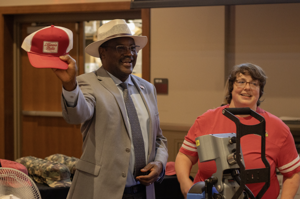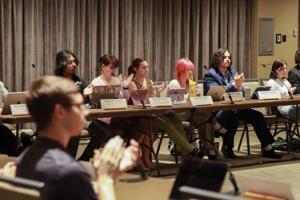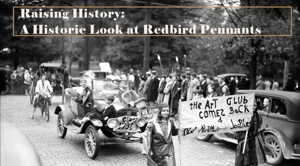The Normal Town Council unanimously passed an ordinance Monday night that targets organizers and participants of nuisance gatherings in response to a “pop-up party” in September that left one person dead and another in critical condition.
The ordinance was revised following public backlash during a Normal Town Council meeting on Oct. 21. The revised ordinance removed loud music from the list of triggering activities and increased the minimum gathering number to trigger the ordinance from three people to 10. Individuals who violate the ordinance could face fines of $5,000, with a minimum fine of $1,000.
Despite the revisions, many in attendance were unhappy with the passing of the ordinance, and boos rang out after the unanimous decision.
Individuals expressed their concerns during public comment, many of which were Illinois State University students. Kassidy Wiskari, a junior art education major, said she was concerned about the ordinance's lack of specificity.
“As a member of the YDSA (Young Democratic Socialists of America) here at ISU, and a member of this community, I am thoroughly disappointed with the wording of this ordinance," Wiskari said. "While I do appreciate the changes that have been made, some of the original problems are still present. Not only are the fines still extreme, but more importantly, the language is vague throughout the ordinance.”
Karla Bailey-Smith, who represented the steering committee for the Central Illinois chapter of the American Civil Liberties Union (ACLU), also objected to the ordinance.
“While much has been done to improve the definition of a nuisance gathering, the version the council is considering tonight creates a threshold that is far too low for the penalties that attach," Bailey-Smith said.
Bailey-Smith brought up other concerns including the lack of a mandated dispersal order before the issuing of tickets. She described the fines as “oppressive,” and argued that the minimum fine of $1,000 is “overly burdensome,” for young people.
Joseph Bloom-Boedefeld, a senior production design and technology major, was concerned about how the ordinance would impact homeless individuals.
“My main concern, currently, is how this ordinance will impact the unhoused people who live in our community," Bloom-Boedefeld said. "Even with the requirement of having two out of the 11 qualifying offenses—which are all already illegal—and the need for approval from a supervisor to order a gathering to disperse, there is room for language in the ordinance to be misused and taken advantage."
"In order to avoid the potential misuse of this ordinance, the groups of unhoused people in our community would need to isolate themselves from each other…this would be an infringement on their rights and a threat to their health and safety,” Bloom-Boedefeld continued.
Bloom-Boedefeld was specifically worried by some of the triggering offenses, such as criminal trespassing. Boedefeld worried that, if unhoused people were to be ticketed under the ordinance, the minimum fine would be unrealistic for them to pay.
Some of the council members defended the ordinance and its intentions.
“If it is expensive, then in some respects, this ordinance is achieving the desired result of making people consider carefully whether or not they want to organize a gathering of individuals that the repercussions of their actions may come back and affect their wallet," Council Member Karyn Smith said. "And so, that deterrent effect is achieving an outcome that is desirous to prevent the activity, not to line the town’s budget.”
Smith also pushed back against the notion that the ordinance would target specific groups of people.
“I would just ask as much as several people highlighted that this was targeting specific groups and individuals. I’m asking if individuals are considering stereotyping the reactions of the police because in my experience with the Normal Police Department, the officers are acting in professional manners,” Smith said.
Council Member Chemberly Harris gave an explanation into the chosen amount for the fines.
“[From] my understanding, we paid a significant cost for property damage as well as time that was spent for the cleanup, which is another reason why we talk about the money aspect,” Harris said.
Assistant City Manager Brian Day added that it took “16 hours” for Normal Parks and Recreation to clean up one park.
Corporation Counsel Jason Querciagrossa later addressed the dispersal issue.
“You get at the people that are committing the bad behaviors, so no one can get a ticket for being out at a nuisance gathering if they’re not either committing one of the qualifying acts or if an order to disperse has been issued and they don’t disperse," Querciagrossa said. "So, really, everyone that’s going to get a ticket has to make some active choice—whether they choose to attend and not disperse or attend and commit a qualifying act or promote one of these nuisance gatherings.”
The ordinance is expected to go into effect immediately.













